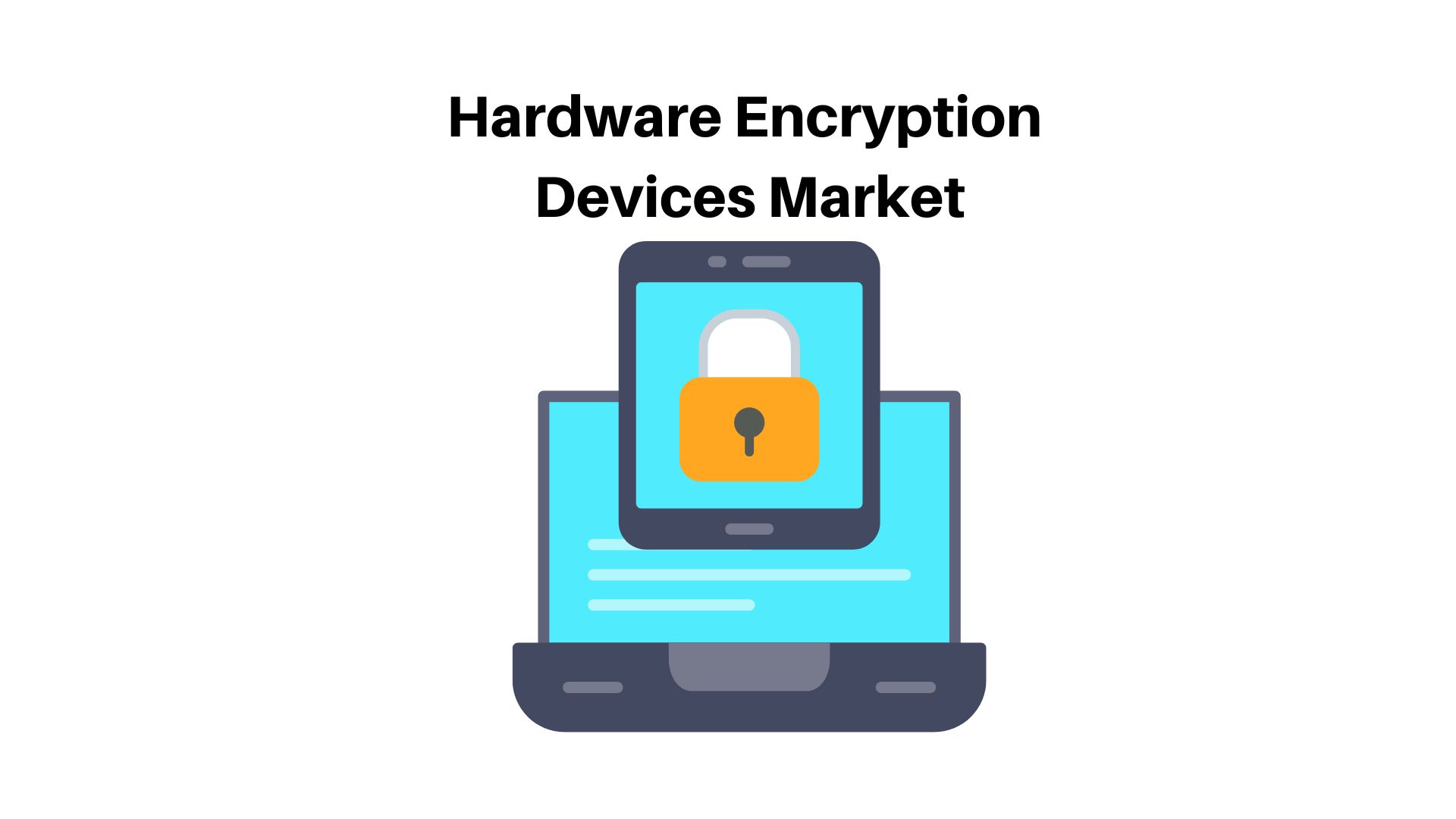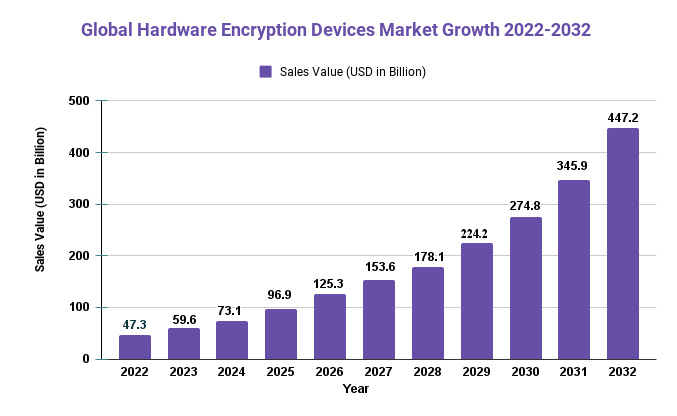Hardware Encryption Devices Market to Hit ( USD 447.2 Bn ) Globally, by 2032 at 25.9% CAGR

Page Contents
Market Overview
Published Via 11Press: Hardware encryption devices are security products used to encrypt and decrypt data in order to protect it from unauthorized access. They find widespread application in industries such as healthcare, banking, financial services, government, and the military for safeguarding sensitive information. The global hardware encryption devices market is expected to expand at a significant pace due to the increasing adoption of cloud computing services and the need for secure data in transit and at rest.
Hardware encryption devices market growth has been impressive and is expected to continue in the coming years. Hardware encryption devices provide data security at rest, in transit, and during use by encrypting it before transmission or storage – providing an extra layer of protection. This technology is employed across various industries such as healthcare, banking, government agencies, and military forces alike.
The growth of the hardware encryption devices market is being spurred on by several factors, such as increasing demands for data security, an increase in data breaches and cyber-attacks, and adherence to regulations like GDPR and HIPAA. Furthermore, cloud computing and the Internet of Things (IoT) are further driving demand for hardware encryption devices. By 2032, analysts forecast that global hardware encryption device sales will reach USD 447.2 billion with a compound annual growth rate (CAGR) of 25.9% from 2022-2032.
In terms of product type, the market is segmented into USB flash drives, external hard disk drives, and internal hard disk drives. USB flash drives are expected to hold the largest share due to their widespread adoption and affordability. On the basis of end-users, there are five main sectors: healthcare, government, BFSI, military & defense, and others; with healthcare having the highest share due to growing demands for data security & privacy in this industry.
Geographically, North America is expected to hold the majority of the market due to its rapid adoption rate of advanced technologies and the presence of major players in the region. On the other hand, Asia Pacific is forecasted to expand at a faster clip due to the increasing adoption of cloud computing and IoT as well as the increased need for data security & privacy in that region.
Request For Sample Report Here: https://market.us/report/hardware-encryption-devices-market/request-sample/

Key Takeaways
- The global hardware encryption devices market is projected to experience significant growth over the coming years, driven by rising cloud computing adoption and the need to protect data in transit and at rest.
- The banking and financial services sector is the leading end-user segment for hardware encryption devices. North America leads this market in terms of volume, followed by Europe and Asia Pacific.
- The major players in this market include Thales e-Security, Gemalto NV, Seagate Technology PLC, and Western Digital Corporation.
Regional Snapshot
North America leads the market for hardware encryption devices, followed by Europe and Asia Pacific. North America's growth can be attributed to large technology companies and the increasing adoption of cloud computing. On the other hand, Asia Pacific is expected to experience the highest growth rate due to increasing cloud-based services adoption as well as rising data breaches.
Drivers
- The global hardware encryption devices market is primarily driven by several factors:
- As cloud computing adoption increases, so does the need for data security – both during transit and at rest. There have been an increasing number of data breaches as a result of mobile devices and portable storage devices being increasingly used, necessitating stringent regulations and compliance checks to ensure data remains secure.
Restraints
- The hardware encryption devices market may face the following obstacles in the coming years:
- Hardware encryption devices tend to be expensive, have compatibility issues with legacy systems, and lack awareness about their advantages.
- In conclusion, the global hardware encryption devices market is expected to expand significantly due to an increasing need for secure data in transit and at rest, driven by cloud computing adoption and increasing numbers of data breaches. Major players include Thales e-Security, Gemalto NV, Seagate Technology PLC, and Western Digital Corporation; however, there may be challenges such as high cost, compatibility issues, limited awareness, and lack of open-source encryption software available.
Opportunities
- Growing Concern over Data Security: With an increase in cyber-attacks and data breaches, there is growing anxiety over data security. This has created an opportunity for hardware encryption devices to guarantee this protection.
- With the rising adoption of cloud computing: There is an increased need for secure data transfer and storage. Hardware encryption devices can offer this protection and present market opportunities.
- Growing Use of IoT Devices: As the number of IoT devices continues to expand, there is an urgent need for secure communication between them. Hardware encryption devices can offer this protection and present new market opportunities in this space.
- Rising Need for Compliance and Regulations: As industries increasingly look to meet compliance and regulations, hardware encryption devices offer organizations a way to meet these demands and open up new market opportunities.
Challenges
- High Cost: Hardware encryption devices tend to be expensive compared to software encryption solutions, making it difficult for some organizations to justify their adoption.
- Key Management: Maintaining keys used for encryption can be complex and require specialized knowledge, which may deter some organizations from using hardware encryption devices.
- Integration: Integrating hardware encryption devices into existing systems can be a complex undertaking, making it difficult for some organizations to adopt them.
- Limited Compatibility: Hardware encryption devices may only work with certain operating systems, which could limit their application in certain industries.
View Detailed TOC of the Report: https://market.us/report/hardware-encryption-devices-market/table-of-content/
Recent Developments
- Quantum-Safe Encryption: There is growing concern that quantum computers could break existing encryption algorithms. Hardware encryption devices using quantum-safe encryption are being developed as a solution to this issue.
- Biometric Authentication: Some hardware encryption devices now employ biometric authentication to guarantee that only authorized personnel can view encrypted data.
- Development of multi-factor authentication: Some hardware encryption devices now employ multi-factor authentication as an extra layer of protection.
- Integration with Cloud Computing: Hardware encryption devices are being integrated with cloud computing to offer secure data transmission and storage.
Key Market Segments
Type
- Encrypted Hard Disk Drives
- Encrypted Solid-State Drives
- Hardware Security Module
Application
- IT & Telecom
- BFSI
- Government & Public Utilities
- Manufacturing Enterprise
Key Market Players
- Seagate Technology PLC
- Western Digital Corp
- Samsung Electronics
- Thales
- Micron Technology Inc
- NetApp
- Kingston Technology Corp
- Toshiba
- Gemalto
- Certes Networks Inc.
- Kanguru Solutions
Report Scope
| Report Attribute | Details |
| The market size value in 2022 | USD 47.3 Bn |
| Revenue forecast by 2032 | USD 447.2 Bn |
| Growth Rate | CAGR Of 25.9% |
| Regions Covered | North America, Europe, Asia Pacific, Latin America, and Middle East & Africa, and Rest of the World |
| Historical Years | 2017-2022 |
| Base Year | 2022 |
| Estimated Year | 2023 |
| Short-Term Projection Year | 2028 |
| Long-Term Projected Year | 2032 |
Frequently Asked Questions
Q. What is a hardware encryption device?
A: hardware encryption device is an electronic component designed to encrypt data with specialized hardware, offering more protection compared to software-based solutions. It requires less space and power consumption compared to its software counterparts.
Q. How does a hardware encryption device function?
A: hardware encryption device encrypts data using specialized hardware. It uses a unique key to encrypt it, which can only be decrypted using that same key.
Q. What are the Advantages of Utilizing a Hardware Encryption Device?
A: Hardware encryption devices offer higher security, superior performance, and ease of use. Furthermore, these solutions are resistant to attacks that target software-based encryption solutions.
Q. What are the different types of hardware encryption devices?
A: Hardware encryption devices include USB drives, hard drives, and network encryption tools.
Q. What are the drawbacks of using a hardware encryption device?
A: Hardware encryption devices come with several drawbacks, such as high cost, key management issues, integration difficulties, and limited compatibility.
The team behind market.us, marketresearch.biz, market.biz and more. Our purpose is to keep our customers ahead of the game with regard to the markets. They may fluctuate up or down, but we will help you to stay ahead of the curve in these market fluctuations. Our consistent growth and ability to deliver in-depth analyses and market insight has engaged genuine market players. They have faith in us to offer the data and information they require to make balanced and decisive marketing decisions.